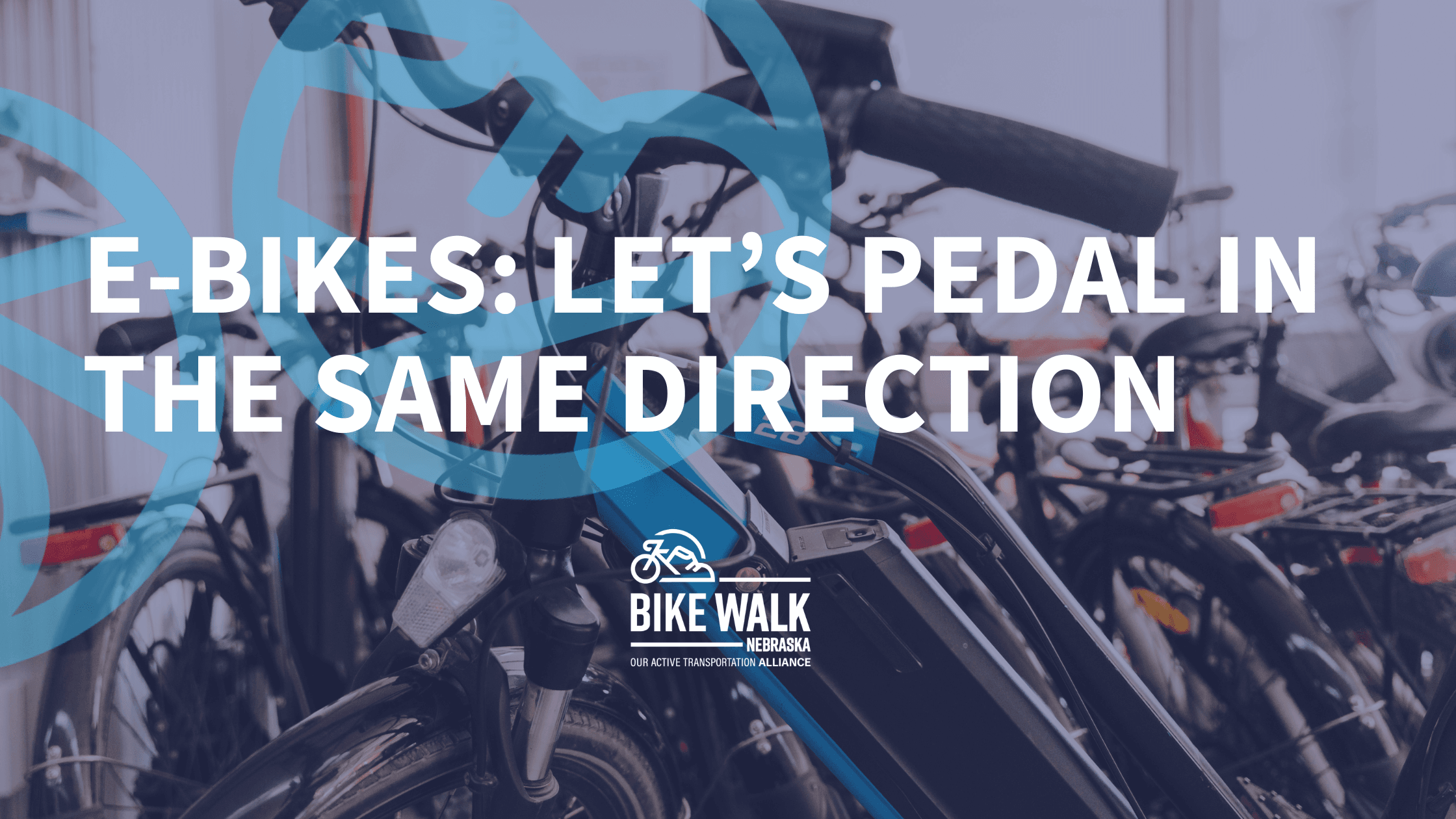
Are e-bikes *really* the problem? We say no.
Over the last couple of weeks, a recurring conversation flared up within Nebraska's bicycle social media circles, eventually leading to a story reported in the mainstream media: electric bicycles and the impact thereof.
Few topics will get the comments section fired up more than someone complaining about e-bikes on trails: "They are wonderful! They are a menace! They aren't allowed! Yes, they are allowed! Throttles! Speed limits! Oh, the humanity!”
And this is all coming from inside the house.
As Bike Walk Nebraska, it's our job to represent the best interests of the cycling community and other vulnerable road users. Therefore, to clarify Bike Walk Nebraska's stance on e-bikes, we offer the following:
We enthusiastically support electric bicycles. Having an electric assist while pedaling knocks down several barriers keeping people from riding: hills, fitness, sweat, convenience, and enjoyment, to name a few. E-bikes also allow people to continue getting physical activity as they age.
People riding fast on bicycles, electric or not, on infrastructure incompatible with higher speeds, is the problem. Not e-bikes as a whole.
These things encourage more people to be on bikes rather than in cars. More people on bikes means better physical and mental health, cleaner air, improved road conditions, and more accessible transportation options for folks without a vehicle.
It also supports advocates making the case for better planning and infrastructure to improve safety for everyone on our roads. Better safety encourages more people to ride. It's one big, virtuous cycle.
The "bike boom" induced by the COVID-19 epidemic was fueled by electric bikes. A study out this week shows the sale of electric bicycles has outpaced electric cars in recent years. Today, it is common to see cargo-style, folding, or full-suspension e-bikes in addition to traditional designs. Electric bikes are here to stay.
Seeing this rapidly changing landscape, Bike Walk Nebraska worked with State Senator Jane Raybold earlier this year on a bill to update the definition of an "electric bicycle" within state statute. The bill includes nationally recognized best practices to provide clarity on what an e-bike is vs. isn't:
- It isn't a device that looks like a bicycle, but lacks pedals;
- Or a device that looks like a bicycle, but is equipped with an after-market, gas-powered engine
- Or anything 100% dependent on throttle for power (i.e., scooter or moped).
People who use electric bicycles are subject to the same laws, regulations, and trail etiquette norms as everyone else. Regardless of what type of bike we are riding, we ALL must follow the rules of the road and are compelled to ride safely according to our surroundings.
This latest social media flare-up focused mainly on multi-use trails. Our trails are used by all kinds of folks, including people walking, running, skating, and scootering at various speeds; children; people with pets; and people using assistive devices.
People riding fast on bicycles, electric or not, on infrastructure incompatible with higher speeds, is the problem. Not e-bikes as a whole. Using a different example, nobody calls for all motorcycles to be banned from the road because of a few dangerous risk-takers weaving in and out of traffic at high speeds.
That's precisely why we passed the e-bike classification in the Unicam this year. It gives land and facility managers a clear definition to navigate the nuances of e-bikes and infrastructure access, helping them ensure safe, legal e-bikes have access while limiting access for devices that aren't.
What’s most concerning to us, is the distractions that inhibit the community’s ability to pull in the same direction towards a safer, more bike-friendly state.
Arguments and controversy are more likely to be picked up by the media, and unfortunately, those are what’s most likely to stick in the minds of the champions the community needs to push the causes for a bicycle-friendly Nebraska; especially when those stories do not accurately represent the information. From an advocate’s perspective, it causes confusion about laws and regulations, dilutes our message, and inhibits our advocacy efforts.
We recommend that advocates remain focused on the issues which will move the needle forward, such as protected infrastructure and trail connections.
We all want more folks on bikes, better infrastructure, and safer, more accessible active transportation in Nebraska. Electric bicycles help us get there. Let’s pedal in the same direction in order to give us a better chance of making that vision a reality.

